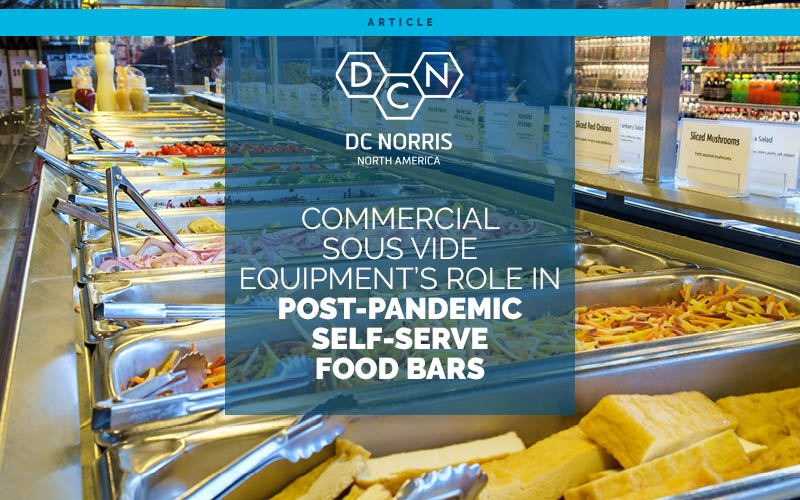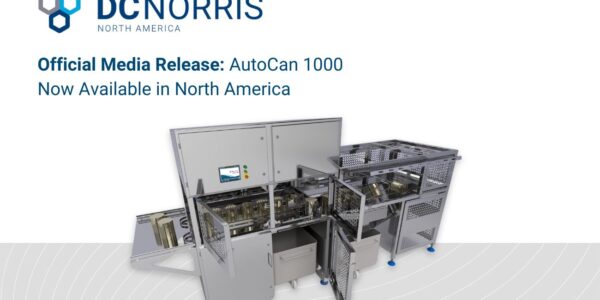Commercial Sous Vide Equipment’s Role in Post Pandemic Self-Serve Food Bars
Self-serve food bars and self-service food stations have become major revenue generators for grocers, convenience stores, restaurants, and more in the last decade. They offer fast, healthy options for on-the-go customers. Then came COVID, shuttering most of the deli and self-serve food bars across North America. Retailers pivoted to pre-packed options in place of the self-service deli bars but most noted that the shift didn’t make up for the revenue void left in the wake of the closed self-serve stations.
Self-Serve Food Bars Are Making a Comeback
Now, with a COVID vaccine readily available and normalcy beginning to return, many retailers are beginning to re-open their self-serve food bars. Most report that customers are welcoming the food bars back with open arms after many feared adoption may be low for perceived health and safety reasons. However, there are two distinctly new challenges facing retailers reopening hot bars and self-service deli stations: labor and product shortages from vendors.
Commercial Sous Vide Equipment to Ease the Labor Shortage
When the food bars were closed, employees whose job it had been to prepare food for and stock them were relocated within the stores where possible. Some were laid off. Now, retailers are struggling to get those people back amidst one of the most challenging hiring environments we’ve seen in North America in decades.
Some are turning to new preparation methods where they can streamline the labor and resources required to produce the foods stocked in their self-serve food bars. One such preparation method is sous vide. Advances in commercial sous vide equipment have allowed retailers to use fully automated sous vide machines like the CT-1 to cook foods safely, completely unattended. Often, foods like chicken are left to cook overnight, while the store is closed. This can be done safely with the CT-1 because it is the only commercial-scale sous vide machine with a product temperature probe that monitors core product temperature. Most commercial-scale sous vide machines lack this unattended automation as they only measure the water-bath temperature.
Retailers Turn to Commercial Sous Vide Equipment to Prepare Foods Vendors Can’t Keep Stocked
Along with the labor challenges, the pandemic has brought logistical and supply chain challenges to nearly every sector of the economy. Foodservice, perhaps most dependent on as-needed deliveries that must depart and arrive on time to ensure safety, has felt a dramatic impact.
Several retailers have begun the process of building out their own kitchens and in some cases, central production kitchens to prepare foods stocked in their hot and cold self-serve bars. Whether operating one location, or several across the country, food service businesses are finding that it makes better business sense to cook and prepare these foods in their own facilities today.
Businesses are again turning to the CT-1, the only automated commercial sous vide equipment built to meet the batch and floorspace requirements of commercial-scale operations. To keep up with supply needs, retailers need to be able to produce large batches safely and efficiently, for inventory. Sous vide affords this solution, with the CT-1 capable of cooking up to 120lbs per batch, unattended.
More About the CT-1
DC Norris has been manufacturing the leading industrial sous vide equipment, used around the globe, since the 1980s. Before the pandemic, as chefs and consumer trends drove interest in the cooking method, businesses began contacting DC Norris North America in search of a sous vide machine that was automated like the industrial models but small enough to fit in a commercial kitchen. Seeing a similar market need, DC Norris soon developed and launched the CT-1. With a 50 gallon gross capacity, a first-of-its scale product temperature probe, simple touch screen controls, and seamless integration with Virtual Chart Recorder for unparalleled food safety – the CT-1 hit the market long before the pandemic-induced strain of labor shortages and supply chain issues did. Fortunately, the sous vide method of cooking foods ‘low and slow’ lends itself to helping food producers overcome those new challenges.
Talk with a DC Norris Expert About Your Commercial Sous Vide Equipment Needs
Contact our office to speak directly with one of our equipment experts. They’ll help you find the right equipment to meet your specific business needs quickly.



